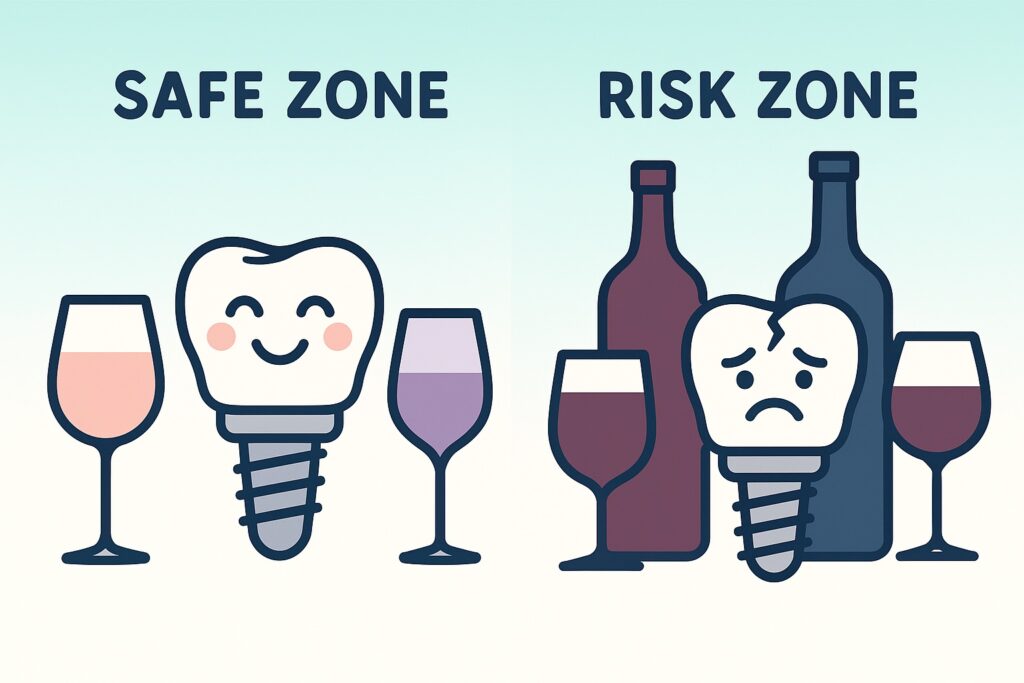Dental implants require stable healing and bone integration to be successful. Even with modern surgical techniques and high-quality materials, the healing period is crucial, and lifestyle choices can make or break the outcome. Among these, alcohol consumption is one of the most overlooked but significant risk factors.
Many patients assume that moderate drinking won’t affect recovery, but research shows alcohol can directly interfere with the body’s healing process. From delaying soft tissue repair to disrupting bone growth around the implant, even casual alcohol use during recovery can increase the likelihood of implant failure. Understanding how much alcohol is too much — and when it’s most harmful — is essential for ensuring long-term implant success.
How Dental Implants Heal and Integrate
Once a dental implant is placed, the body begins a process called osseointegration, where bone tissue grows and fuses around the titanium implant. This is the foundation of implant stability and long-term success.
The healing process typically follows these phases:
- Initial Healing (First 72 Hours): Blood clot forms around the surgical site, starting inflammation and tissue repair.
- Early Bone Healing (1–4 Weeks): Soft tissue closes around the implant while the jawbone begins early integration.
- Osseointegration (1–6 Months): Bone cells (osteoblasts) grow directly onto the implant surface, anchoring it firmly in place.
Any interference during these stages — especially the osseointegration phase — can lead to implant instability or outright failure. Alcohol plays a direct role in slowing or impairing each of these healing phases.
Alcohol’s Effect on Healing and Bone Integration
Alcohol can disrupt nearly every stage of dental implant healing — from soft tissue recovery to bone integration. Its effects are both systemic and local, increasing the risk of complications such as infection, delayed healing, and outright implant failure.
1. Reduced Blood Supply
Alcohol acts as a vasodilator initially, but chronic use leads to vasoconstriction, reducing blood flow to tissues. This means less oxygen and fewer nutrients reach the surgical site, slowing healing and increasing the chance of infection.
2. Impaired Immune Response
Alcohol suppresses immune cell activity, particularly neutrophils and macrophages. This weakens the body’s ability to fight bacteria during the early stages of healing — a critical period for dental implants.
3. Negative Impact on Bone Metabolism
Research shows that alcohol interferes with osteoblast function, the cells responsible for forming new bone. It also increases osteoclast activity, which breaks down bone tissue. Together, these effects reduce the strength and density of bone integration around the implant.
4. Delayed Soft Tissue Healing
Alcohol inhibits collagen production, which is essential for gum tissue repair. Poor soft tissue healing around the implant increases the risk of peri-implantitis and long-term failure.
How Much Alcohol is Too Much During Implant Recovery?
There’s no universally agreed threshold for “safe” alcohol intake during dental implant recovery, but most dental professionals recommend complete abstinence during the critical healing phase — at least 72 hours to 7 days post-surgery. Some extend this period to 2–4 weeks, depending on individual healing speed and complexity of the implant procedure.
What the Research Says:
- A 2015 study published in the Journal of Oral and Maxillofacial Surgery found that regular alcohol consumption during the early post-op period significantly increased implant failure rates, especially in smokers or patients with comorbidities.
- Another study in 2019 noted that alcohol intake of more than 2 standard drinks per day negatively impacted bone regeneration and osseointegration in animal models — a trend likely to hold true in humans.
General Guidelines:
- First 72 Hours: Avoid alcohol completely — this is when clotting, inflammation, and initial healing occur.
- First 2 Weeks: Strongly advised to stay alcohol-free, as early osseointegration begins.
- First 1–3 Months: For complex cases or patients with risk factors (diabetes, smoking), long-term abstinence or minimal alcohol intake (e.g., 1 drink per week max) may be recommended.
Short-Term vs Long-Term Alcohol Use and Implant Health
Understanding the difference between short-term and long-term alcohol use is key to assessing overall implant risk. While the immediate post-surgery period is the most sensitive, long-term alcohol habits can also impact the stability and lifespan of dental implants.
Short-Term Alcohol Use (During Healing Phase)
As outlined earlier, alcohol during the first few weeks after implant placement can:
- Slow tissue regeneration
- Impair immune defense
- Reduce bone integration
- Increase post-op complications like infection or dry socket
Even occasional drinking during this time may increase the risk of implant failure, especially when combined with smoking, poor oral hygiene, or uncontrolled diabetes.
Long-Term Alcohol Use (After Full Healing)
Once the implant has fully integrated (usually after 3–6 months), moderate alcohol use poses a lower immediate risk — but chronic, heavy drinking can still threaten implant health over time.
Key long-term risks include:
- Peri-implantitis: A chronic infection of the tissues around the implant. Heavy alcohol use dries the mouth, increases plaque formation, and weakens gum defenses.
- Bone Loss: Chronic alcohol consumption disrupts calcium absorption and bone maintenance, contributing to long-term bone resorption around the implant.
- Neglected Oral Hygiene: Alcohol abuse often correlates with poor oral care, which further increases the risk of implant failure.
Advice for Patients and Aftercare Recommendations
If you’ve had dental implant surgery or are planning to, alcohol management is a critical part of your post-operative care. Here’s what dental professionals typically recommend to ensure optimal healing and long-term success:
1. Avoid Alcohol Completely for At Least 72 Hours
This is the minimum period required to allow blood clot formation and initial soft tissue healing. Drinking during this time can disrupt clotting and increase the risk of dry socket or infection.
2. Stay Alcohol-Free for the First 1–2 Weeks
During this time, early osseointegration begins. Even low amounts of alcohol may impair bone healing or prolong inflammation, so abstinence is strongly advised.
3. Follow Your Surgeon’s Timeline
Depending on your specific case — such as sinus lifts, bone grafts, or multiple implants — your oral surgeon may recommend avoiding alcohol for up to 4 weeks or longer. Follow their instructions closely.
4. Focus on Nutrition and Hydration
Replace alcoholic drinks with water, electrolyte fluids, or nutrient-rich beverages like smoothies to support healing. Good hydration and balanced nutrition accelerate tissue repair.
5. Resume Alcohol Gradually and Responsibly
After full recovery (typically after 6–12 weeks), occasional moderate alcohol may be safe. However, regular follow-ups and good oral hygiene remain essential.
6. Tell Your Dentist About Your Habits
Always be transparent about alcohol use before and after implant surgery. It helps your dental team make informed decisions and tailor your aftercare for the best possible outcome.
Conclusion
Alcohol consumption — even in moderate amounts — can significantly compromise the success of dental implants, especially during the healing period. From delaying soft tissue recovery to impairing bone integration, alcohol interferes with nearly every critical phase of implant healing. The risk is highest in the first few weeks after surgery, when the body needs full immune and regenerative function.
While moderate alcohol use after full recovery may not always lead to failure, chronic or excessive drinking increases the chances of complications like bone loss and peri-implantitis over time. The best approach is to abstain completely during early healing and consult your oral surgeon or dentist before resuming alcohol.
Dental implants are a long-term investment in your health — and managing alcohol intake is a small but essential step in protecting that investment.

